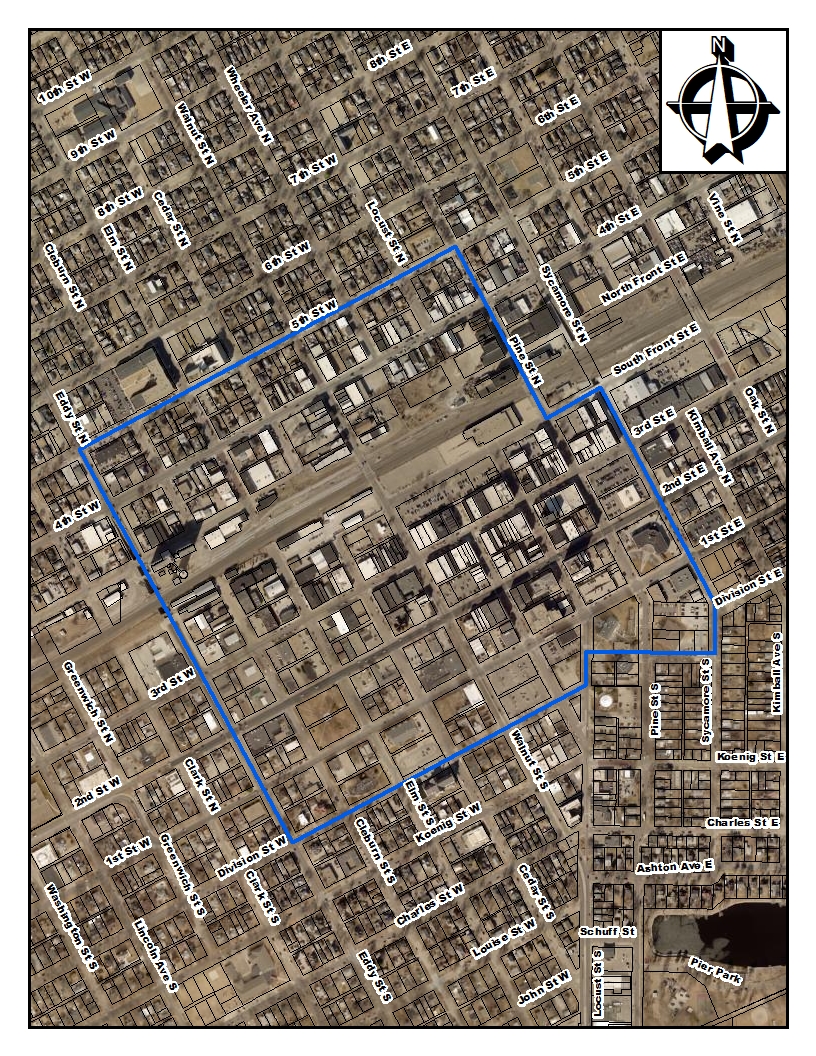Funding Sources, Applications & Fees for Community Redevelopment Authority Meeting
As developers and investors present proposals for development within the Community Redevelopment areas, assistance may be available to help with the completion of a project through an application process. Each application is done in the order in which they are received. Developers can apply for Tax Increment Financing (TIF) and various Grant Programs (i.e. Façade Improvement Program and Life/Safety/Infrastructure Program). The Community Redevelopment Authority can also make grants for other purposes to organizations or agencies within the CRA areas if necessary for further community growth.
Applications
Funding Source
Tax Increment Financing
The CRA provides funding to selected, eligible redevelopment projects. The CRA is allowed to "capture" the property tax on the increased valuation of property created by selected, eligible redevelopment projects. This "captured" tax increment then is used to assist in funding public improvement costs, rehabilitation, acquisition, demolition and workforce housing within the project for up to fifteen years. the project. This process is referred to as Tax Increment Financing (TIF).
The TIF approval process consists of three major steps:
Designation of a blighted area - This step identifies the portions of the community that are eligible for the use of TIF. Specific statutorial criteria must be met for an area to be designated as blighted.
Preparation and approval of a redevelopment plan - The city prepares a specific redevelopment plan for the projected area. The plan has certain statutory requirements and includes a description of the tax increment projected area.
Approval of a redevelopment agreement - Following approval of the redevelopment plan, the CRA and the developer/owner negotiate a redevelopment agreement. This contract sets forth the mutual responsibilities of both parties and includes the financial terms of a project. As part of the agreement process, the developer negotiates loan terms with a private lender, or bond underwriter if the project is utilizing a publicly offered bond issue.
Micro-Tax Increment Financing (Micro-TIF)
Micro-Tax Increment Financing (Micro-TIF) is also known as the expedited review of a redevelopment plan used for redevelopment projects. The CRA is allowed to "capture" the property tax on the increased valuation of property created by selected, eligible redevelopment projects. This "captured" tax increment then is used to assist in funding public improvement costs, rehabilitation, acquisition, demolition, and workforce housing within the project for up to fifteen years.
The Nebraska Legislature has adopted LB 1021, under this law, City Councils may pass a resolution allowing for expedited reviews of redevelopment plans for certain qualifying Micro-TIF Projects. The City of Grand Island City Council passed a resolution limiting the expedited review and approval of Micro-TIF projects to 20 per year. In addition, redevelopers must use the standard form developed by the Nebraska Department of Economic Development to prepare their redevelopment plans.
The Nebraska State Statutes Neb. Rev. Stat. § 18-2155 states a redevelopment plan is eligible for expedited review if the following criteria are met:
The redevelopment plan includes only one redevelopment project;
The redevelopment project involves:
(i) The repair, rehabilitation, or replacement of an existing structure that has been within the corporate limits of the city for at least 60 years and is located within a substandard and blighted area; or
(ii) The redevelopment of a vacant lot that is located within a substandard and blighted area that has been within the corporate limits of the city for at least 60 years and has been platted for at least 60 years;
The redevelopment project is located in a county with a population of less than 100,000 inhabitants; and
The assessed value of the property within the redevelopment project area when the project is complete is estimated to be no more than:
(i) $350,000 for a redevelopment project involving a single-family residential structure;
(ii) $1.5 million for a redevelopment project involving a multi-family residential structure or commercial structure; or
(iii) $10 million for a redevelopment project involving the revitalization of a structure included in the National Register of Historic Places.
Pursuant to the Act, application fees for micro TIF Projects may not exceed fifty dollars ($50.00). Such redevelopment plans will be submitted to the City Administrator or their designee (Community Development Department) for review, and the plan must be approved within thirty (30) days after submission of the plan. Developers must complete their redevelopment project within two years after the redevelopment plan is approved by the City.
Facade Improvement Program
The Façade Improvement Program provides funding assistance to property owners in targeted areas of Grand Island. Funds provided by the program are utilized to rehabilitate commercial building frontages.
By making these funds available, the Façade Improvement Program contributes to the improvement of the overall appearance of buildings and entire neighborhoods, which results in a stronger customer base and economic growth for area businesses. Recipients are required to invest a minimum of $7.00 into the total cost of the project for every $3.00 received from the façade grant. The Community Redevelopment Authority in the past has granted funds for façade improvements in amounts ranging from $10,000 to $300,000.
Life Safety and Infrastructure Grant Program
The creation of the Life Safety and Infrastructure Grant Program is to foster the development of upper-story residential units in and near the downtown core. It is the goal of the Business Improvement districts, downtown property owners, the Grand Island City Council, and the Community Redevelopment Authority to develop 50 upper-story residential units within this area by the end of September 30, 2028.
The acquisition, site work and construction of all improvements will be paid for by the developer. The developer is responsible for and will provide evidence that they can secure adequate debt financing to cover the costs associated with the acquisition, site work, and remodeling. The CRA may grant funds as provided for in the CRA Annual Budget to developers of up to $20,000 per two-plus bedroom unit and $15,000 per single-bedroom unit developed on the upper floor of a building for life safety improvements. These funds may be granted for new & existing residential units within the Redevelopment Area. Grants made under this program are to be paid to the developer upon completion of the project and upon the developer showing evidence of such completion including certificates of occupancy, building inspection reports, approval of the fire marshal, paid invoices, lien waivers, and evidence of actual costs.
Eligible properties:
Must be located within the designated area.
Require installation of Life Safety Equipment or modification of the building for Life Safety requirements as determined by the adopted building or fire code:
These include but are not limited to:
Fire Sprinklers (and water lines/services to support sprinklers)
Additional Exits
Elevators
Monitoring Equipment
Fire Separation Walls
Designated Area:

Community Redevelopment Authority Fee Schedule
Effective October 1, 2024 | |
|---|---|
Service or Product | Fee |
Blight Study Adoption: | $1,500.00 |
Redevelopment Plan Adoption/Amendment: | |
Under $500,000 | $1,500.00 |
$500,000 to $1,500,000 | $ 2,500.00 |
$1,500,001 to $3,000,000 | $ 4,000.00 |
$3,000,001 to $5,000,000 | $7,500.00 |
Over $5,000,000 | $10,000.00 |
Micro Tax Increment Financing: | $50.00 per State Statute |
